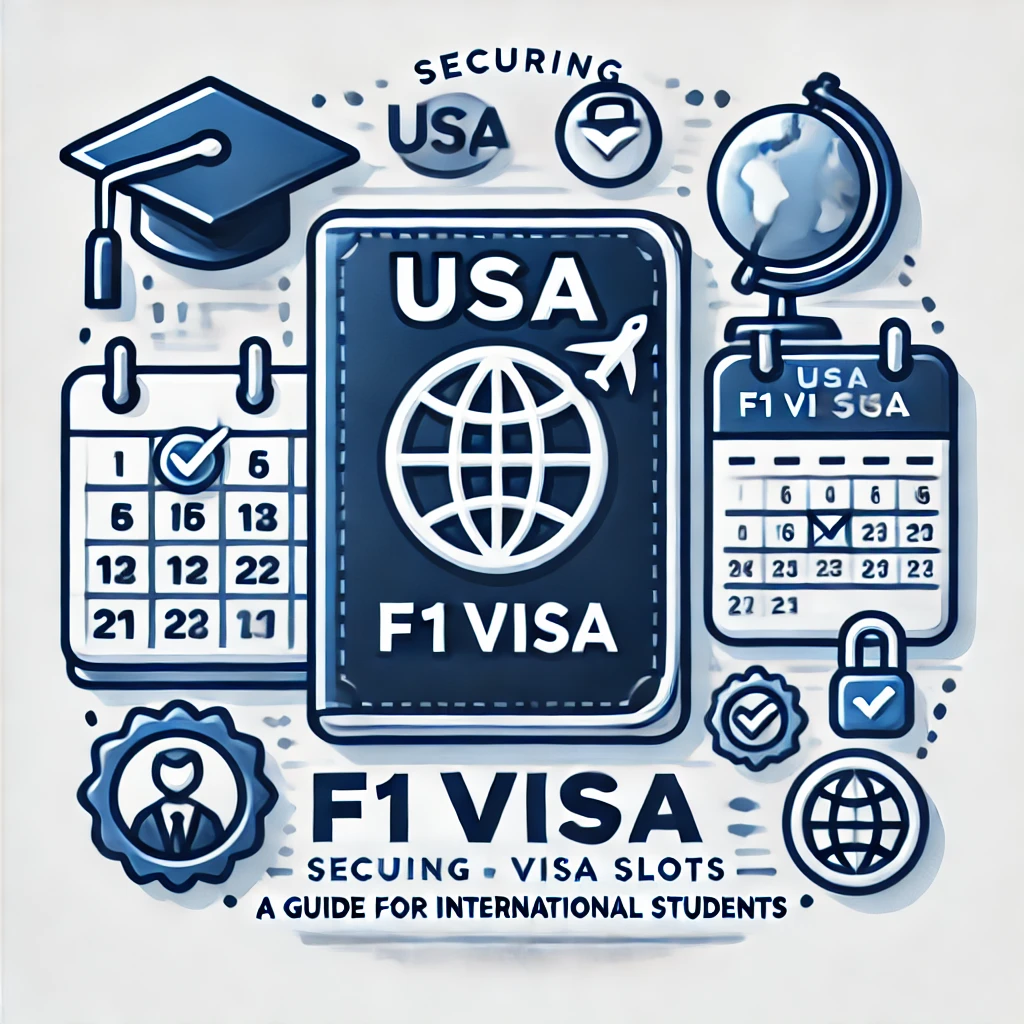
The Complete Manual for the F1 Visa The F1 visa is a non-immigrant student visa that permits foreign students to study in the United States. For prospective students who want to study in the United States, it is essential to comprehend the F1 visa procedure. A.
This visa is intended exclusively for students who are enrolled in academic or English language programs at a U.S. A. organization. . To apply for an F1 visa, you must first be accepted by a school that has been approved by the Student and Exchange Visitor Program (SEVP). Students receive a Form I-20 upon acceptance, which is necessary for the visa application.
Along with confirming the student’s acceptance, this form lists the funds needed to cover their living expenses and educational costs while in the United States. S. . Completing the online visa application form (DS-160), paying the SEVIS fee, & setting up a visa interview at a U.S.
are all steps in the F1 visa process. S. . embassy or consulate. It is crucial to remember that the F1 visa is more than just a means of travel; it also carries additional requirements that students must follow, like continuing to be enrolled full-time and achieving satisfactory academic standing. Students must be aware of these requirements in order to guarantee compliance and prevent any problems while they are in the United States.
S. . Students should also be informed about their rights and obligations under this type of visa, as well as possible career paths like Optional Practical Training (OPT) following graduation. An essential step that calls for careful thought and organization is planning & preparation for the F1 visa application.
Students should thoroughly research the academic programs and institutions they are interested in before applying. This entails being aware of the school’s overall reputation, campus amenities, faculty credentials, and curriculum. To make sure they can pay for tuition and living expenses while studying in the United States, students should also assess their financial status.
S. Students can make a realistic budget by using the estimated costs that many institutions post on their websites. Students should also look into any financial aid or scholarship opportunities that might be accessible to overseas students. Students can start the application process as soon as they have decided on their preferred school & acquired the required funds.
This entails filling out the application forms that the school requests & sending in any supporting documentation that may be required, including personal statements, recommendation letters, and transcripts. Students will receive a Form I-20, which is necessary for the F1 visa application, following receipt of an acceptance letter. Verifying the accuracy of this form is essential because any errors could cause issues during the visa interview process. Students should also begin getting ready for the DS-160 form, which questions them about their background & goals in the United States and requests extensive personal information. S. .
Getting an interview slot for an F1 visa can be one of the hardest parts of the application process. Interview spots at U.S. are in high demand, particularly during periods of high application. S. .
Consulates and embassies can fill up rapidly. Students are therefore advised to make advance plans and set up their interviews as soon as possible after obtaining their Form I-20. Students can schedule appointments with many embassies months in advance, so using this option can greatly improve the likelihood of getting a preferred time slot. Students should schedule their interviews early and be flexible with the times and dates of their interviews. Being flexible with alternate dates can speed up the process if a preferred time slot isn’t available. Certain embassies might provide expedited appointment options for specific situations, like impending academic programs or urgent travel needs.
Detailed information about appointment availability and any applicable special procedures can be found on the embassy’s website. Also, since the outcome of the interview will greatly influence whether the visa is approved, it is imperative to prepare well for it. An extensive collection of documents proving a student’s eligibility and desire to study in the US is needed for the F1 visa form. The main document that attests to acceptance into an academic program is Form I-20, which is issued by the SEVP-approved organization.
Along with this form, students need to present a valid passport that will still be valid six months after their planned stay in the United States. A. a current passport-sized photo that satisfies the U.S. A.
Also required is the Department of State. Additional crucial records include evidence of financial support, which can be provided in a number of ways, including bank statements, letters of scholarship, or affidavits from sponsors or family. Also, academic records from prior institutions, such as transcripts and diplomas, may be required of students. It’s also a good idea to include any results from standardized tests (like the GRE or TOEFL) that the selected university might require.
Simplifying the application process and lowering anxiety can be achieved by gathering these documents well in advance of the interview date. It takes careful preparation and practice to be ready for a successful F1 visa interview. Knowing that the interview’s goal is to determine whether the applicant truly plans to study in the United States is among the most crucial pieces of advice. A. & has enough money to sustain themselves while they are there.
Students should be prepared to clearly state their academic objectives and describe how they plan to study in the United States. S. conforms to those objectives. Building confidence & ensuring clarity during the actual interview can be achieved by practicing answers to frequently asked interview questions.
Presenting oneself confidently and professionally is another essential component of a successful interview. Pupils should arrive at the embassy or consulate on time and wear appropriate clothing for the interview. Keeping a cheerful attitude during the interview is also crucial because it may make an impression on the consular officer that lasts. Also, when responding to inquiries, it is essential to be truthful and open; any discrepancies or apparent dishonesty may result in issues or possibly the rejection of the visa application. It can be discouraging for prospective students to be denied an F1 visa or to have their application delayed, but it is crucial to handle these circumstances with fortitude and resolve.
In the event that a visa application is turned down, the applicant will be given a written explanation of the reasons why. Before reapplying, it is essential to address any issues by comprehending these reasons. Denials frequently occur for a variety of reasons, such as a lack of financial support, a lack of connections to the country of origin, or an inability to show that one intends to return once studies are finished. When there are delays, students should continue to be proactive and inquire about the status of their applications with the embassy or consulate. Administrative processing or requests for more documentation can occasionally cause delays.
It can reduce anxiety and guarantee that all required actions are completed on time to keep one updated on the status of one’s application. Students should spend time improving their application by fixing any flaws found in their first submission if they are reapplying after being rejected. recognizing demand during peak seasons.
Interview slots at U are frequently in high demand during peak seasons. A. embassies and consulates, which makes it difficult for students to get an appointment on time. Students should routinely check the availability of appointments and be ready to move swiftly when openings occur in order to lessen this problem.
making use of online tools and resources. Insights into when slots are likely to open up can be obtained by using online resources and tools that monitor appointment availability. Students can use these resources to stay informed & make wise choices regarding their application process. Investigating Other Choices. If possible, students should think about applying at several consulates; depending on demand, some may have shorter wait times than others. Inquiring directly with consulates for advice on appointment scheduling or any possible expedited options available for urgent cases may also be helpful.
Students can improve their chances of getting an interview in a timely manner by looking into alternate possibilities. Students can more effectively negotiate slot availability issues and land on-time interviews by continuing to be adaptable and proactive in their approach. Getting help from advisors and educational consultants can greatly increase a student’s chances of completing the F1 visa application process.
These experts know a great deal about U. A. immigration laws and practices, as well as information about the different educational options in the nation.
They can offer individualized advice based on each student’s unique situation, assisting them in choosing their educational paths. Also, consultants can help with document preparation, making sure that all required paperwork is correctly filled out & turned in on time. Before students face consular officials, they frequently hold mock interviews to help them hone their answers and gain confidence.
In addition, educational advisors can provide helpful information about financial aid or scholarship opportunities that might be available to international students specifically. Prospective students can improve their chances of succeeding academically in the United States & more skillfully negotiate the complexities of the F1 visa application process by utilizing these resources. To sum up, obtaining a student visa to study in the United States necessitates careful planning, preparation, and awareness of the numerous requirements and difficulties involved in the F1 visa process.
Prospective international students can improve their chances of securing an F1 visa & starting their academic journey in America by adhering to these rules and asking for help when necessary.


